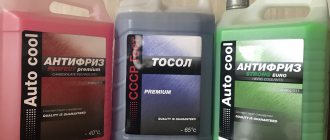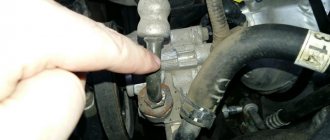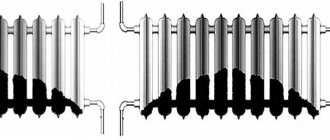Is it possible to add water to the cooling system?
Of course you can! Why not - but your long-running engine will require repair after a few thousand kilometers! And this is natural. There are several reasons for this:
- Water oxidizes metal walls - radiators, pipes, engine block, etc., which will eventually lead to rusting. We will provoke excess heating of the unit.
- Afterwards, rust may precipitate, which will lead to clogging of the cooling channels. The engine will overheat.
- Water already boils at 100 degrees Celsius, which cannot effectively cool the engine.
- Water freezes in winter - if you miss it, it will simply break the system.
- Some Japanese and European cars simply will not start with water; they have a sensor that determines the quality of the liquid.
Now from personal experience - I myself know how the radiator rusts and clogs after using water, I did it on my Moskvich 2140, many years ago. So no need to pour! It is not right.
Antifreeze - composition
Ever wondered what it consists of? What is its composition? Essentially it's just:
- Alcohol – methyl (or isopropyl) is used, it is poisonous and should not be drunk! Previously, of course, there were compositions with ethyl alcohol, but our compatriots drank them for a good cause, so now only “methyl”.
- Water - here its larger volume, usually about 60 - 70%, it all depends on the concentration and temperature threshold.
- Surfactants – detergents, fight against poplar buds, flies, on the windshield, etc.
- Dyes - they are the ones who paint the “antifreeze” blue, so similar to antifreeze.
- Flavorings – give the anti-freeze a pleasant smell – Christmas tree, banana, strawberry, etc.
The whole composition, as you can see, is quite “primitive”, but essentially nothing more is needed - for washing glass.
What is anti-freeze
Before moving directly to the issue at hand, you need to understand the differences between liquids - antifreeze and antifreeze (coolant, antifreeze).
Anti-freeze, as the name suggests, is capable of not freezing at low temperatures, and its task is to clean the car windshield at negative ambient temperatures. Antifreeze consists of the simplest elements - alcohol, water and various additives (aromatics, dyes, etc.). Since water contains alcohol, it does not freeze even at low temperatures, and the higher the concentration of alcohol in the anti-freeze, the lower the temperature it is able to retain its properties.
Anti-freeze products can be divided into three types, depending on the alcohol used in them:
- Isopropyl. Alcohol is harmful to the human body and should never be taken orally. Even if you drink 100 ml of such alcohol, it can be fatal;
- Methanol. Alcohol, which has a simple monohydric composition, is also toxic to the human body;
- Bioethanol. Alcohol is relatively harmless to the human body, similar in its characteristics to ordinary medical alcohol. Used in good anti-freeze products.
Please note: In the late 90s, ordinary medical alcohol was actively used in antifreeze. But due to the massive consumption of this liquid “internally”, which was cheaper than alcoholic beverages due to the lack of excise stamps, over time this anti-freeze was banned.
One of the three types of alcohols listed above is mixed with water, the liquid is colored with ordinary dye, some compounds are added to improve the quality of cleaning, and from this an anti-freeze product is obtained.
So what happens if you fill it with anti-freeze?
Now we come to the most interesting part - the outcome, so what happens if you pour anti-freeze liquid into the cooling system?
Let's imagine this hypothetically, because I do not encourage you to do this:
- When the engine warms up, methyl alcohol will quickly begin to evaporate, and as we remember, it is “poisonous”, that is, you will breathe it inside the car, because the stove sucks in air from the front. Possible poisoning.
- This “slurry”, which is left without alcohol, can simply freeze even at sub-zero temperatures.
- The surfactants that are in the composition will begin to foam wildly (the pump will begin to whip it up), essentially these are washing powders - foam will creep out of the radiator into the cooling system and the tank, which will quickly freeze at minus temperatures, forming traffic jams and “airing”! Engine overheating is guaranteed.
- Perhaps it will quickly eat rubber gaskets and other sealing elements - who knows what is in the composition.
- The walls of the engine and pipes will begin to oxidize from the same surfactants.
- If motor oil gets into the engine system, the antifreeze will not be able to “overcome” it; it is not designed to remove oil. But antifreeze or antifreeze would simply absorb the oil into its composition.
If you don’t want to “ruin” your engine QUICKLY, don’t pour anti-freeze into the cooling system, it’s simply dangerous! It is not designed for such operating conditions.
On the way, there may be a need to fill the cooling system with another liquid other than antifreeze, for example, if the radiator is broken, and the system is simply leaking - then just fill it with water, this is much more correct. But then, when you arrive at your destination, fix the cooling system, flush it, and fill only with antifreeze - antifreeze, this is the most correct way.
Don't do nonsense - NEVER pour anti-freeze into the cooling system. THIS IS COMPLETE BULLSHIT! Failure of your unit is almost guaranteed, not immediately, but after some time.
I hope I explained it popularly, if it’s not entirely clear, watch the video - just about the complex.
This is where I end, read our automotive website.
( 9 votes, average: 4.67 out of 5)
Often, novice drivers ask if it is possible to use antifreeze instead of antifreeze. Everyone has their own reasons for this. Most often, non-standard liquids are used when it is necessary to get to the nearest populated area, but sometimes people simply add the first liquid they come across to antifreeze, without thinking about the consequences. After which they have to capitalize on the power unit. A rarer case is the use of anti-freeze liquid for glass in order to save money. This approach is not only incorrect, but also dangerous for the engine. Well, the amount saved can be considered very conditional.
What happens if you pour antifreeze into the washer reservoir?
YES absolutely nothing! It's absolutely safe! You will also use it to wash your windshield, that's all!
Many people can now say - yes, ethylene glycol is much more toxic (antifreeze) than, say, methyl alcohol (antifreeze). YES no guys, in terms of toxicity they are approximately the same, it’s just that glycols are much more expensive, about 2 - 3 times than methyl alcohol, so it’s simply not advisable to use it in a “wash”!
For the tank itself, for the pipes and other washer systems, there will also be nothing wrong; on the contrary, they will be covered with a small layer of additives that should protect against corrosion, even if there is little metal there, if only in the pump, and in the injectors, but at least they are. Although such protection will quickly be washed away by subsequent anti-freeze! So don’t panic, just ride around and calmly throw out all the antifreeze or antifreeze.
So what can you pour antifreeze into the tank? YES, of course you can - but it costs 5 times more than the washer. For example, 1 liter of the cheapest antifreeze costs about 60 - 80 rubles, but for 90 rubles you will buy 5 liters of antifreeze!
Now the video version.
Did you like our site? Join or subscribe (you will receive notifications about new topics by email) to our channel in MirTesen!
Compound
Is it possible to use antifreeze instead of antifreeze? The answer to this question should begin by considering the composition of the glass fluid, as well as antifreeze. This will allow you to understand the principle of operation of these technical fluids, as well as the difference between them.
The basis of antifreeze is ethylene glycol
, or other higher alcohol. Also, various additives are added to antifreeze that prevent oxidation and destruction of parts of the power unit and cooling system. In addition, there are substances that increase the boiling point of the liquid. A small amount of water is present. The exact composition and proportions are usually not disclosed by the manufacturer, but a simple listing is enough for us.
Anti-freeze products are made from water diluted with isopropyl or methyl alcohol. Soap additives are also added there, which make it possible to more effectively clean the windshield of dirt. This is the simple and understandable composition of non-freezing washer fluid.
What other liquid can be poured into the car instead of antifreeze to make it work?
View full version: What if instead of water, you fill it with anti-freeze?
No need to say that there is no better than antifreeze and antifreeze. I know, but still, everything happens in life, especially in Russia, especially on domestically produced cars










